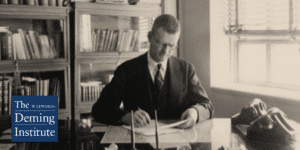Deming Philosophy
By John Hunter, founder of CuriousCat.com. Satisfied customers switch, for no good reason, just to try something else. Why not? Profit and growth come from customers that boast about your product and service – the loyal customer. He requires no advertising or other persuasion, and brings a friend along with him. Dr. W. Edwards Deming […]
By John Hunter, author of the Curious Cat Management Improvement Blog. Fundamental attribution error: attribute fault or defect to the individual without first considering the systemic effect. When we fall into this trap the system is not improved. What we want to do is when we find poor results is think about how the system […]
By John Hunter, founder of CuriousCat.com. Dr. Deming was constantly learning from others. He also pointed out that we can be led astray by failing to understand data. This quote, included in Out of the Crisis (page 394), shows both of those traits and illustrates a common trap of performance appraisal – using evidence that […]
Guest post by Dennis Stevens When I show the Kanban board, a tool that is borrowed from Lean, I hear, “Well, software development is an artistic process – you can’t apply manufacturing principles to it.” Or, “I was involved in a Six Sigma (or TQM) project that was devastating – Lean doesn’t translate to software […]
By John Hunter, author of the Curious Cat Management Improvement Blog (since 2004). In my opinion Deming’s ideas and lean thinking share many similarities. I do see plenty of weaknesses in lean manufacturing efforts at organizations. Most of the weaknesses are due to bad implementation of lean manufacturing rather than lean thinking missing fundamental elements […]
By John Hunter, founder of CuriousCat.com. I suggest reading this excellent paper on Improving Problem Solving by Ian Bradbury and Gipsie Ranney. As they note, problem solving is not a substitute for innovation and improvement as solving a problem solving only returns you to the status quo. The paper also considers the relationship between problem […]
By John Hunter, author of the Curious Cat Management Improvement Blog (since 2004). The aim proposed here for any organization is for everybody to gain – stockholders, employees, suppliers, customers, community, the environment – over the long term. W. Edwards Deming describing the purpose of an organization in The New Economics, page 51 When you […]
By John Hunter, founder of CuriousCat.com. Jan 24 1989 – first presentation of Deming’s “System of Profound Knowledge” Knowledge of variation; statistical theory Knowledge of the distinction between common causes and special causes Knowledge about the loss from tampering Knowledge about the interaction of forces Knowledge of operational definitions Knowledge psychology Knowledge of cooperation and […]
By John Hunter, founder of CuriousCat.com. Dr. Deming’s included the the theory of knowledge (how do we know that what we “know” is so) as one of the four inter-related components of his management system. How to apply an understanding of the theory of knowledge within the management system for their organization often gives people […]
Guest post by John Hunter, founder of CuriousCat.com. In Fourth Generation Management (I highly recommend this book, by the way), Brian Joiner provided an excellent summary of the options to get better “results” (as measured by the data used). The options are to: distort the system distort the data improve the system Obviously we hope […]



